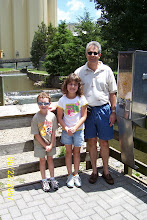
It was found recently that a "popcorn-ball" design has increased the efficiency of dye-sensitized solar cells. They are cheaper, but only half as efficient, as existing solar technology. A group at the University of Washington has been working on this. They used a mixture of small (15 nanometers) and large (300 nanometers) particles of zinc oxide, and found an increase in efficiency, from 2.4 percent using only small particles to 6.2 percent with the combination. The next step is to do it with titanium oxide, which currently gives an 11% efficiency, and see how much of an increase can be achieved with that material. Read about it here.
While ball shapes are good for solar cells, apparently you want your fuel cells in a cubic shape according to researchers at Brown.
Two great obstacles to hydrogen-powered vehicles lie with fuel cells. Fuel cells, which like batteries produce electrical power through chemical reactions, have been plagued by their relatively low efficiency and high production costs. Scientists have tested a wide assortment of metals and materials to overcome the twin challenge.
Now a team led by Shouheng Sun, professor of chemistry at Brown, has mastered a Rubik’s Cube-like dilemma for dealing with platinum, a precious metal coveted for its ability to boost a chemical reaction in fuel cells. The team shows that shaping platinum into a cube greatly enhances its efficiency in a phase of the fuel cell’s operation known as oxygen reduction reaction. Sun’s results have been published online in the journal Angewandte Chemie. The paper was selected as a Very Important Paper, a distinction reserved for less than 5 percent of manuscripts submitted to the peer-reviewed journal.
This brings us another step closer to the future as envisioned by Ray Kurzweil. By the way, I came across a talk by him he gave at a TED conference, here.


No comments:
Post a Comment